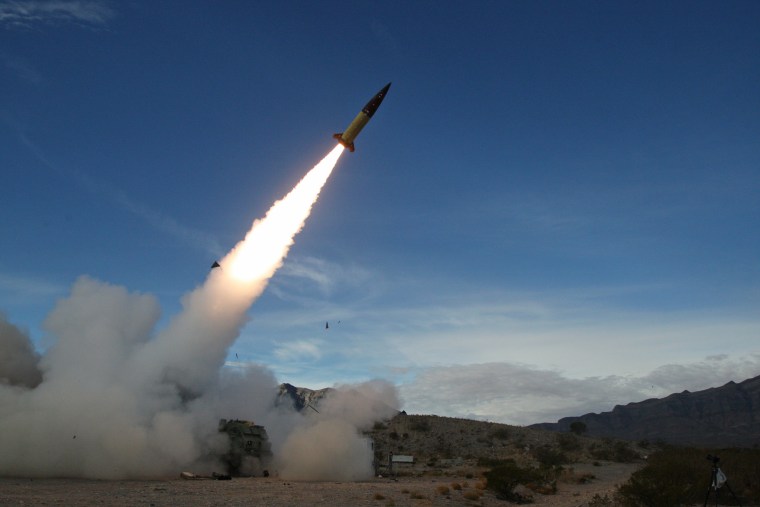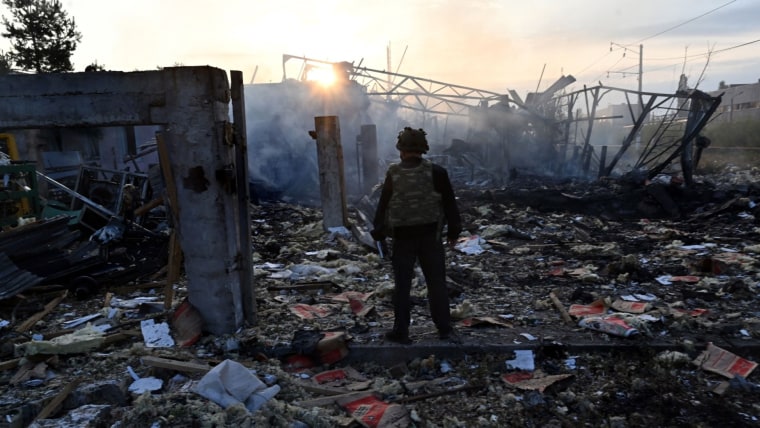President Joe Biden has told his Ukrainian counterpart, Volodymyr Zelenskyy, that the United States will provide a small number of long-range missiles to aid the war with Russia, three U.S. officials and a congressional official familiar with the discussions told NBC News on Friday.
The officials, who were not authorized to speak publicly, did not say when the missiles would be delivered or when a public announcement would be made.
For months, Ukraine has asked for the Army Tactical Missile System, known as ATACMS, which would give Kyiv the ability to strike targets from as far away as about 180 miles, hitting supply lines, railways, and command and control locations behind the Russian front lines.

Defense officials have said the U.S. does not have a large stockpile of excess ATACMS, which have a bigger payload than traditional artillery, to provide to Ukraine. Also, some in Washington have resisted supplying the weapon, known colloquially as “attack-ems,” out of fear that it would widen the war with Russia.
The congressional official said there was still a debate about the type of missile that would be sent and how many would be delivered to Ukraine. They added that countries in Eastern Europe had already given Ukraine large portions of their weapons stockpiles.
NBC News has approached Russia’s defense ministry for comment.
Since Russia invaded Ukraine in February 2022, the Biden administration has shifted its stance on which weapons it is ready to provide to Ukraine’s military.
The White House initially withheld approval for requests for Stinger anti-aircraft missiles, Howitzer artillery pieces, anti-ship missiles and HIMARS systems, but later gave the green light to them being shipped.
The latest move comes just over two months after Biden signed a presidential waiver on the transfer of cluster munitions to Ukraine, despite concerns from human rights groups and some U.S. allies that their use will lead to more civilian casualties.
The dual-purpose improved conventional munitions, or DPICMs, are surface-to-surface warheads that explode and disperse multiple small munitions or bombs over wide areas — bringing more widespread destruction than single rounds.
Some human rights groups oppose their use because of concerns that unexploded bomblets, or duds, could explode after battle, potentially injuring or killing innocent civilians.
Their use by both sides has been documented during the war in Ukraine, according to Human Rights
In May, America and its allies also agreed to provide F-16 fighter jets to Ukraine.
While Ukrainian troops have breached Russia’s heavily fortified first defensive lines in the south and made progress in the east, with winter approaching Kyiv’s military has yet to achieve a decisive breakthrough.
This has contributed to concerns about ongoing allied support, with signs of frustration among even its strongest backers. Poland’s prime minister said this week that his country would no longer send arms to its neighbor, amid a spiraling trade dispute and ahead of national elections.
At the same, Ukraine has intensified a campaign of missile and drone strikes targeting sites deep behind Russian lines. The occupied Crimean peninsula has come under repeated attack, with the headquarters of Russia’s Black Sea Fleet hit in the latest fiery missile strike on Friday.














Recent Comments